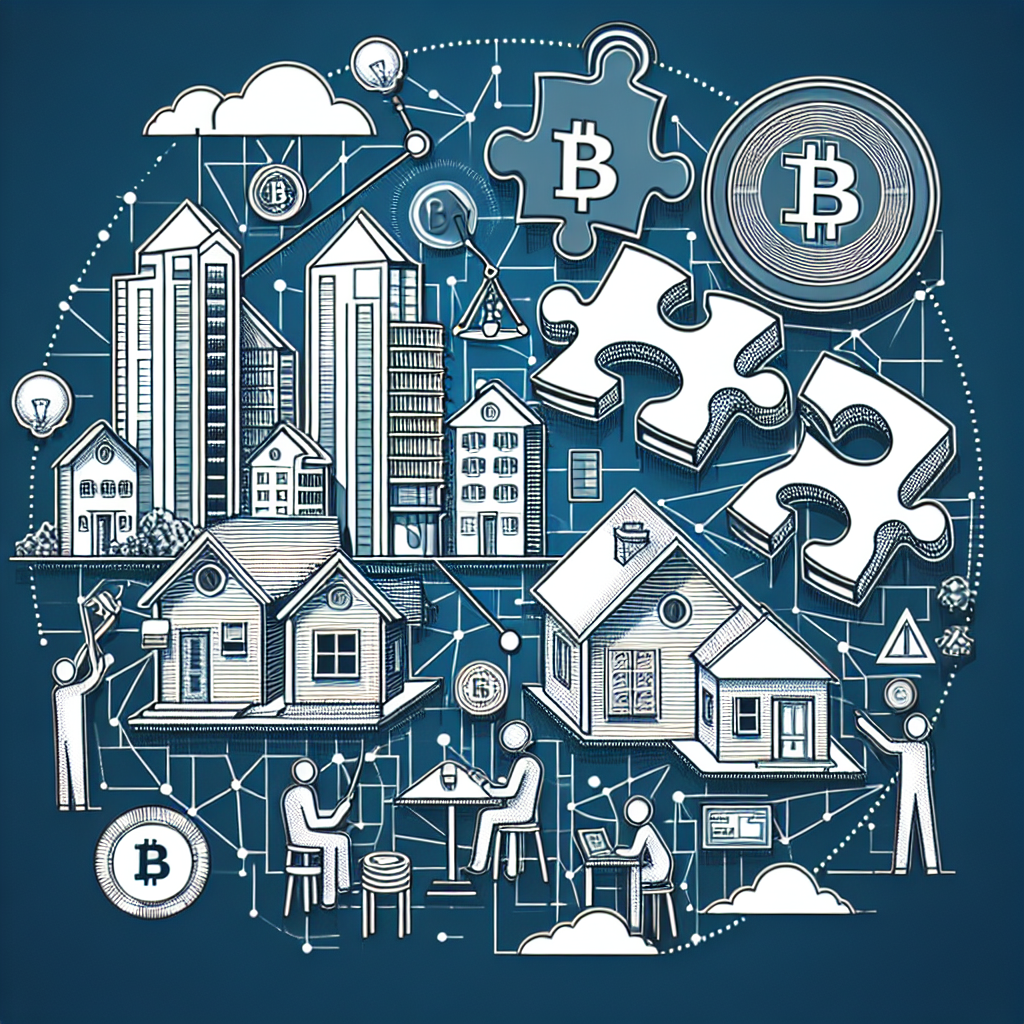Imagine a world where owning a piece of prime real estate is as easy as buying a few tokens online. Tokenized real estate and property ownership is revolutionizing the way we perceive and invest in the real estate market. With the advent of blockchain technology, individuals now have the opportunity to own fractional shares of properties all around the world. This innovative concept not only opens up a world of investment possibilities but also provides a new level of liquidity and accessibility. Whether you’re a seasoned investor or just getting started, tokenized real estate presents a tantalizing opportunity to diversify your portfolio and make the most of the flourishing real estate market.

The Concept of Tokenized Real Estate
Understanding Tokenization
Tokenization refers to the process of converting real-world assets, such as real estate, into digital tokens on a blockchain. In the context of real estate, tokenization involves representing ownership rights of properties as digital tokens, which can then be bought, sold, or traded on a digital platform. These tokens are typically backed by the underlying property, giving token holders a share in the ownership and potential returns of the property.
Definition of Tokenized Real Estate
Tokenized real estate refers to the practice of using blockchain technology and digital tokens to enhance the liquidity, accessibility, and efficiency of real estate investments. It allows investors to purchase fractional ownership in a property, making real estate investment more accessible to a wider range of individuals.
Advantages of Tokenized Real Estate
Increased Liquidity
One of the main advantages of tokenized real estate is the increased liquidity it offers. Traditional real estate investments often have a long lock-up period, making it difficult for investors to access their capital. With tokenized real estate, investors have the ability to buy and sell tokens on a digital platform, providing them with greater liquidity and the flexibility to exit their investments when needed.
Fractional Ownership
Tokenization allows for the fractional ownership of real estate, meaning that investors can purchase and own a portion of a property rather than the entire asset. This opens up opportunities for individuals with smaller budgets to invest in high-value properties that they may not have been able to afford otherwise. Fractional ownership also brings diversification benefits, as investors can spread their investments across multiple properties.
Greater Accessibility to Investors
By tokenizing real estate, investment opportunities that were once limited to a select few can now be accessed by a broader range of investors. Tokenization removes many of the barriers to entry, such as high minimum investment requirements, and allows individuals to invest in real estate with smaller amounts of capital. This increased accessibility democratizes the real estate market and provides investors with more opportunities to diversify their portfolios.
Efficiency and Transparency
Tokenization leverages blockchain technology to improve the efficiency and transparency of real estate transactions. Blockchain allows for quicker and automated processes, reducing the need for intermediaries and lowering transaction costs. Additionally, all transactions and ownership records are recorded on a decentralized and immutable ledger, ensuring transparency and reducing the risk of fraud or manipulation.
Lower Cost and Entry Barrier
Traditional real estate investments often come with high fees, such as brokerage commissions, legal costs, and maintenance fees. Tokenized real estate eliminates many of these fees, as transactions can be executed on a digital platform with lower overhead costs. Moreover, the lower entry barrier allows investors with limited capital to participate in the real estate market, providing opportunities for financial growth and wealth creation.
Diversification Opportunities
Tokenized real estate offers investors the ability to diversify their portfolios beyond traditional asset classes. By investing in multiple properties across different locations, investors can spread their risk and potentially achieve a more stable and balanced investment portfolio. Diversification is a fundamental strategy for minimizing risk and maximizing returns, and tokenized real estate provides investors with a convenient and cost-effective way to achieve this.

Tokenization Process
Asset Evaluation and Fragmentation
The tokenization process begins with the evaluation of the underlying real estate asset. This involves assessing various factors such as location, market value, income potential, and legal compliance. Once the asset has been evaluated, it is fragmented into digital tokens, each representing a share of ownership in the property. The fragmentation process determines the value and number of tokens that will be issued, taking into consideration the desired fractional ownership structure.
Creating Digital Tokens
After the asset has been fragmented, the next step is to create digital tokens. These tokens are created on a blockchain platform, following a specific protocol or standard. Common standards for real estate tokens include ERC-20 and ERC-721, which provide standardization and compatibility within the blockchain ecosystem. Each token is assigned a unique identifier and represents a certain percentage ownership in the underlying property.
Smart Contract Implementation
Smart contracts play a crucial role in tokenized real estate. These self-executing contracts are written on the blockchain and define the rules and conditions of token ownership, transfer, and distribution of profits. Smart contracts ensure that transactions are secure, transparent, and automated. They also facilitate the distribution of rental income or proceeds from property sales to token holders in a seamless and efficient manner.
Initial Token Offering
Once the tokens have been created and the smart contracts have been implemented, the property owner or tokenization platform can proceed with the initial token offering (ITO). During the ITO, investors can purchase the digital tokens using cryptocurrency or fiat currency. The funds raised from the ITO are used to finance the acquisition or development of the property. The tokens can be further traded on secondary markets, allowing for liquidity and potential capital appreciation.
Tokenized Real Estate Platforms
Emerging Platforms
There are several emerging platforms in the tokenized real estate space that facilitate the issuance, trading, and management of real estate tokens. These platforms act as intermediaries, connecting property owners with potential investors. Examples of emerging platforms include Harbor, Propy, and RealT. These platforms provide a range of services, from token creation and distribution to secondary market trading and portfolio management.
Key Players
In addition to emerging platforms, there are key players in the tokenized real estate market. These players include real estate developers, property owners, token issuers, and asset managers. Real estate developers and property owners can leverage tokenization to access a broader pool of investors and raise capital more efficiently. Token issuers and asset managers play a crucial role in the creation and management of real estate tokens, ensuring compliance with regulatory requirements and providing ongoing support to token holders.
Platform Comparison
Different tokenized real estate platforms offer varying features, services, and capabilities. When comparing platforms, it is essential to consider factors such as security measures, user experience, liquidity, fees, and regulatory compliance. It is also important to evaluate the track record and reputation of the platform, as well as the quality and diversity of the properties available for tokenization. Conducting thorough research and due diligence can help investors choose the platform that best suits their needs and investment goals.

Challenges and Risks
Regulatory Compliance
One of the main challenges in tokenized real estate is navigating the complex regulatory landscape. Depending on the jurisdiction, real estate tokenization may be subject to securities regulations, anti-money laundering (AML) requirements, and know-your-customer (KYC) procedures. Compliance with these regulations is crucial to ensure investor protection and legal compliance. However, regulatory requirements may vary globally, making it essential for tokenized real estate platforms to stay up to date with local regulations and work closely with regulators.
Security and Data Protection
Blockchain technology provides enhanced security compared to traditional systems. However, the implementation of tokenized real estate introduces new cybersecurity risks. It is essential for platforms to implement robust security measures to protect investors’ personal and financial information, as well as the integrity of the underlying blockchain infrastructure. Regular security audits, encryption, and secure storage of private keys are some of the measures that should be in place to mitigate security risks.
Market Volatility and Liquidity Risks
While tokenized real estate aims to increase liquidity, the secondary market for real estate tokens may still be subject to market volatility and liquidity risks. Market conditions, supply and demand dynamics, as well as investor sentiment, can affect the liquidity and pricing of real estate tokens. Investors should be aware of the potential risks associated with illiquid markets and carefully consider their investment horizon and risk tolerance before investing in tokenized real estate.
Lack of Traditional Financing Options
Tokenized real estate presents an alternative financing option for property owners, but it may not completely replace traditional financing methods. Some lenders and financial institutions may be hesitant to accept tokenized real estate as collateral or may not have the systems in place to facilitate tokenized transactions. As the industry evolves, it will be important to bridge the gap between tokenized real estate and traditional financing options to provide property owners with more flexibility and liquidity.
Legal and Regulatory Considerations
Securities Laws
Tokenized real estate is often subject to securities laws, as investors are purchasing assets that potentially generate returns. It is crucial for token issuers and platforms to comply with securities regulations, such as registration requirements, offering restrictions, and investor accreditation. Failure to comply with these laws can result in severe penalties and legal consequences. Working closely with legal advisors and regulatory authorities is essential to ensure compliance and maintain investor confidence.
KYC/AML Compliance
Anti-money laundering (AML) and know-your-customer (KYC) compliance are essential in the tokenized real estate space to mitigate the risk of money laundering and terrorist financing. Tokenized real estate platforms need to implement robust KYC procedures to verify the identity of investors and comply with AML regulations. This includes verifying the source of funds and conducting ongoing monitoring to detect and report suspicious activities. Striking a balance between regulatory compliance and user experience is crucial for the success and legitimacy of tokenized real estate platforms.
Jurisdictional Regulations
Tokenized real estate operates within a global landscape, and regulations may vary from one jurisdiction to another. It is vital for token issuers and platforms to understand and comply with local regulations, ranging from securities laws and tax regulations to property ownership rights. Engaging with legal experts who specialize in blockchain and real estate law can help navigate the complexities and ensure compliance with jurisdictional regulations.

Future Potential and Adoption
Growing Interest and Market Size
The interest in tokenized real estate is growing as more investors recognize the potential benefits of this innovative investment model. The market size for tokenized real estate is projected to increase significantly in the coming years, reaching billions of dollars in transaction volume. As the industry matures and gains more mainstream recognition and acceptance, the adoption of tokenized real estate is expected to accelerate.
Potential Benefits for Investors and Property Owners
Tokenized real estate offers numerous benefits for both investors and property owners. Investors can enjoy increased liquidity, diversification opportunities, and potentially higher returns compared to traditional real estate investments. Property owners, on the other hand, can access a broader pool of capital, streamline fundraising processes, and enhance property management efficiency. Tokenization also enables fractional ownership, making it easier for property owners to sell partial stakes in their properties.
Changing Real Estate Investment Landscape
Tokenized real estate has the potential to revolutionize the real estate investment landscape by increasing transparency, reducing barriers to entry, and enhancing overall market efficiency. The traditional real estate market is often illiquid, opaque, and fragmented, making it challenging for individual investors to participate. Tokenization brings greater accessibility, efficiency, and democratization to the market, allowing investors of all sizes to diversify their portfolios and access previously unattainable investment opportunities.
Real Estate Tokenization Use Cases
Residential Properties
Tokenization provides opportunities for investing in residential properties, allowing individuals to own a fraction of high-value homes or apartment complexes. This opens doors for investors who may not have the means to purchase an entire property but still want to benefit from the potential appreciation and rental income.
Commercial Properties
Commercial properties, such as office buildings or shopping centers, can also be tokenized, giving investors access to income-generating assets with long-term growth potential. Tokenized commercial properties provide diversification and the opportunity to participate in well-established markets that were previously difficult to access.
REITs (Real Estate Investment Trusts)
Tokenization enables the creation of Real Estate Investment Trusts (REITs) in a more efficient and cost-effective manner. REITs are investment vehicles that pool funds from multiple investors to invest in a diversified portfolio of properties. Tokenization allows for the fractional ownership of REITs, opening up investment opportunities to a wider range of individuals and providing more flexibility in portfolio construction.
International Real Estate Investments
Tokenized real estate removes many of the barriers associated with international real estate investments. Through fractional ownership, investors can gain exposure to international markets without the need for significant upfront capital or the complexities of property management in foreign countries. Tokenization brings diversification and the potential for enhanced returns from global real estate markets.
Tokenized Real Estate and Blockchain Technology
Blockchain’s Role in Real Estate
Blockchain technology plays a fundamental role in tokenized real estate by enabling secure, transparent, and automated transactions. Through decentralized ledger technology, blockchain ensures that ownership records, transactions, and smart contracts are recorded in an immutable and tamper-resistant manner. This enhances trust and reduces the need for intermediaries, streamlining real estate transactions and reducing costs.
Enhanced Security and Efficiency
Blockchain provides enhanced security by removing the central point of failure and utilizing cryptographic algorithms to protect data and transactions. By eliminating the need for intermediaries, blockchain also improves efficiency and reduces the time and costs associated with manual processes. The use of blockchain in tokenized real estate offers greater transparency, reduces the risk of fraud, and enhances investor confidence.
Improved Real Estate Transactions
Tokenized real estate and blockchain technology can revolutionize the real estate transaction process. Traditionally, real estate transactions involve multiple intermediaries, lengthy paperwork, and manual verification processes. Blockchain streamlines the entire transaction process, reducing the time, cost, and complexity involved. Additionally, smart contracts facilitate the automation of key steps, such as property transfers and distribution of income, improving transaction speed and accuracy.
Integration with Other Technologies
Tokenized real estate has the potential to integrate with other emerging technologies such as artificial intelligence (AI), Internet of Things (IoT), and virtual reality (VR). AI algorithms can be used to analyze market data and assess property valuations, providing investors with valuable insights. IoT devices can be utilized to monitor and optimize property performance, while VR technology can enhance the virtual property viewing experience. The integration of these technologies can further enhance the efficiency and value proposition of tokenized real estate investments.
Conclusion
Tokenized real estate has emerged as an innovative solution to enhance liquidity, accessibility, and efficiency in the real estate market. By leveraging blockchain technology and digital tokens, investors can now participate in real estate investments with lower entry barriers, increased liquidity, and greater diversification opportunities. However, the industry still faces challenges in terms of regulatory compliance, security, and market volatility. With continued advancements in technology and increased awareness, tokenized real estate has the potential to transform the real estate industry, making it more inclusive, transparent, and efficient. The adoption of tokenized real estate is expected to grow, unlocking new investment opportunities and reshaping the future of property ownership.

